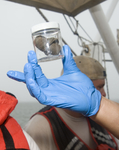Scientists Say Health and Seafood At-Risk from Spill
 BP’s spill does pose threats to human health and seafood safety, according to a new study published by the peer-reviewed scientific Journal of the American Medical Association.
BP’s spill does pose threats to human health and seafood safety, according to a new study published by the peer-reviewed scientific Journal of the American Medical Association.
The report comes days after President Obama swam in the Gulf at Panama City Beach and made of point of eating seafood for the cameras.
“Beaches all along the Gulf Coast are clean, they are safe, and they are open for business,” Obama told reporters.
But are they? That is the lingering question all along the Gulf Coast. What impact will the BP spill have on clean up workers, the local population, the ocean and the seafood?
As the fears and worries continue it means that days into the shrimping season, there is an ongoing debate as to whether it is safe to eat seafood.
The residents of the Gulf will not be reassured to read the JAMA paper
Firstly on general health the JAMA paper argues that “The oil spill in the Gulf of Mexico poses direct threats to human health from inhalation or dermal contact with the oil and dispersant chemicals, and indirect threats to seafood safety and mental health.”
Secondly, on the health of clean-up workers: The scientific paper notes that in Louisiana in the early months of the oil spill, more than 300 individuals, three-fourths of whom were cleanup workers, sought medical care for symptoms such as headaches, dizziness, nausea, vomiting, cough, respiratory distress, and chest pain.
Although these symptoms are typical of acute exposure to hydrocarbons, the paper notes it is “difficult to clinically distinguish toxic symptoms from other common illnesses.”
Thirdly the threat to seafood: “In the near term, various hydrocarbons from the oil will contaminate fish and shellfish” argues the JAMA paper.
It notes that although vertebrates can clear polycyclic hydrocarbons from their systems, “these chemicals accumulate for years in invertebrates”.
In the longer term “trace amounts of cadmium, mercury, and lead occur in crude oil and can accumulate over time in fish tissues, potentially increasing future health hazards from consumption of large fin fish such as tuna and mackerel.”
Co-author of the paper is Gina Solomon, who is a public health expert in the department of medicine at the University of California at San Francisco.
She advised that doctors may be warning pregnant women and children to strictly limit the amount of fish they eat, due to high levels of heavy metals.“It’s like iron filings to a magnet,” she said. “Several years from now the concentration will go up in fish at the top of the food chain — tuna, mackerel, swordfish.”
Government scientists disagree with the JAMA paper. “We don’t agree that’s currently a problem,” said Vicki Seyfert-Margolis, from the office of the chief scientist of the FDA.
But she would say that, wouldn’t she?
